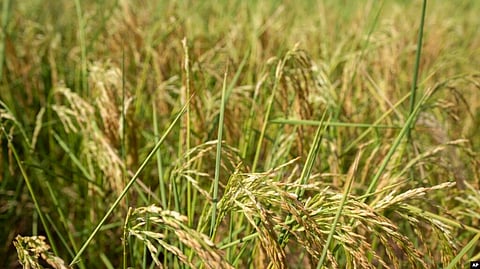China has been hit by record heat waves and droughts this summer, a combined phenomenon that experts say that has the potential to threaten the food, energy and economic security that Beijing values.
The extreme weather — hitting southwestern Sichuan province the hardest — has lasted more than 70 days, marking the country’s worst heat wave since record-keeping began in 1961. Sichuan temperatures have topped 43 degrees Celsius and in Beibei, temperatures bubbled up to 45 degrees Celsius.
At risk, experts say, is agriculture production, energy security and the economy — as well as the general sense of stability that has accompanied China’s economic rise.
Not that China is alone in weather events linked to climate change. Europe also faced extreme heat waves this summer. And in the past few years, wildfires have been growing more frequent and destructivein the western United States.
But in China, the weather forecast carries distinct political implications.
According to the official news outlet, Xinhua, China’s Ministry of Agriculture and Rural Affairs, the Ministry of Water Resources, the Ministry of Emergency Management and the China Meteorological Administration are particularly concerned about the heat wave’s impact on this fall’s grain harvest.
“Chinese authorities have urged targeted measures to alleviate the impact of drought in a bid to secure a good autumn harvest this year,” the Xinhua article said.
Faced with water shortages, the Chinese Communist Party (CCP) had to decide whether it would cut water for agriculture or power-generation, according to Gopal Reddy, founder of the group Ready for Climate.
“It’s really hard to cut water from the agriculture sector because food self-sufficiency is so important in China, and that means we have water shortages that turn into power shortages,” Reddy, who is based in Boston, told VOA Mandarin. “For the typical person in China, they may see rolling power blackouts and cutbacks, but the biggest impact is on the manufacturing sector, because that’s where you get whole parts of the economy that just get shut down due to power shortages.”
It’s a difficult tradeoff to make, Reddy said.
“Regarding water, there’s really nothing other than tough decisions in front of the CCP, from here on out,” particularly at the local level, he added.
Turning to coal
Sichuan mainly relies on hydropower. Located on the fabled Yangtze River, China’s longest at 6,300 kilometers, the province’s hydroelectric capacity dropped by 50% this month as reservoirs were drying up.
To compensate, the province and the nation have turned to coal. Power plants throughout China burned 8.16 million metric tons of coal during the first two weeks of August, up 15% from a year ago, according to data reported by the state-affiliated Global Times.
Sichuan Guang’an Power Generation, the largest coal-fired power plant in the province, has been operating at full capacity for much of August.
“That’s so eye-catching,” said Gabriel Collins, a fellow at Rice University’s Baker Institute, because “the average plant utilization across China over the last few years has been closer to 50%.” The system is under strain, he added.
Energy security has long been one of the top issues facing the Chinese government, according to Philip Andrews-Speed, a fellow at the National University of Singapore’s Energy Studies Institute.
“As in any country, if the lights are going out, industries are closing down, prices are going up, then energy security is right there, one of the top three or four items on the government’s agenda,” he told VOA Mandarin in an interview.
That’s particularly true in light of the upcoming 20th National Congress of the Chinese Communist Party, said Edward Cunningham, director of Harvard’s Asia Energy and Sustainability Initiative. Xi is expected to secure an unusual third term at the twice-a-decade leadership congress in October.
This National Congress “is more tense than most,” Cunningham told VOA Mandarin, and extreme weather isn’t helping. “Local governments are very much focused on minimizing social unrest. Factories forced to shutter for days, deadly rainfall and images of barren fields only exacerbate such tension.” (AS/VOA)


